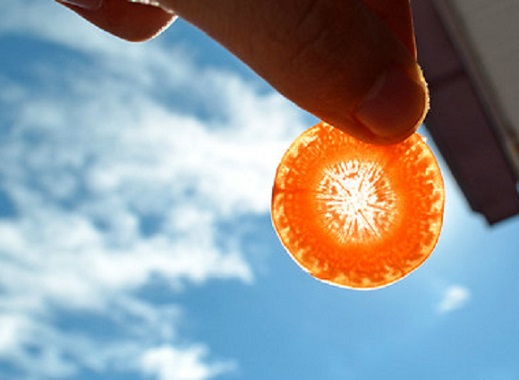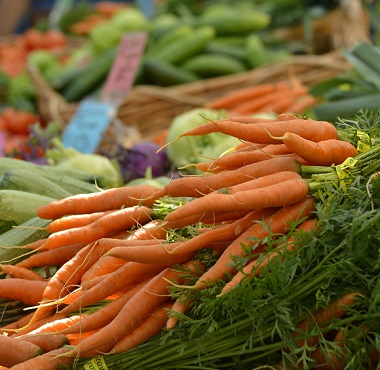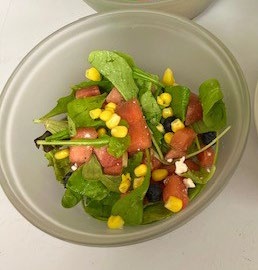In this edition
- Should we really eat our carrots for good eye health?
- National Farmers Market Week
- Eye health, it’s important!
- Watermelon Corn Feta Salad
About the Newsletter
This newsletter contains information about nutrition and eye health, highlights farmers markets, and features a delicious watermelon salad recipe.
Should we really eat our carrots for good eye health?
By Natalie Mazzullo, M.Ed.
Natalie Mazzullo is the associate director for Nevada Geriatric Education Center at the School of Medicine and the coordinator for Extension’s healthy aging engagement at the University of Nevada, Reno.

Carrot in the sky.
Many of us grew up hearing, “You should eat your carrots if you want better eyesight.” Although carrots do support better eye health, there is scientific proof that eating a healthy diet of leafy greens and exercise can lower your risk of age-related eye disease. Maybe Popeye’s strength was in his eyes!
August is National Eye Exam month and in observance, learn how to keep your vision clear and healthy. As we age, getting a baseline eye exam can detect early signs of disease or damage to your eyes. Ophthalmologists, medical doctors who specialize in eye and vision care, recommend periodic eye exams every two to four years from the ages of 40 to 65, and every one to two years after the age of 65. Getting a simple eye checkup and following an eye doctor’s instructions can lower risks of more severe and future damage, allowing you to continue enjoying healthy vision.
One of the most common age-related eye diseases is age-related macular degeneration or AMD. AMD is
an eye disease that can blur your central vision as
seen below.
AMD happens very slowly in some people and faster in others. If you have early AMD, you may not notice vision loss for a long time. That is why it is so important to get regular eye exams to find out if you have AMD.
Risk factors include age 55 and older, a family history of AMD, being white/Caucasian and smoking. National Eye Institute research shows that you may be able to lower your risk of AMD (or slow vision loss from AMD) by making these healthy choices:
- Quit smoking — or do not start
- Get regular physical activity
- Maintain healthy blood pressure and cholesterol levels
- Eat healthy foods, including leafy greens and fish
Eye doctors can treat AMD by using medicines and light or laser therapy. If you live with AMD or other eye disease causing low vision, there is good news! Low vision devices and vision rehab services are available. Vision rehab can help you learn the skills you need to stay independent and active with low vision. You may also be able to make slight changes, in addition to the healthy choices listed above, like:
- Use brighter lights at home or work
- Wear anti-glare sunglasses
- Use a magnifying lens for reading and up-close activities
Remember, be like Popeye and eat your spinach, stay active and schedule an eye exam to support your eye health and stay independent!
for more INFORMATION about Natalie
National Farmers Market Week

Carrots at the farmers market stand.
Farmers markets have fruits and vegetables at the peak of the growing season, providing produce is at its freshest and tastes the best. Shopping at farmers markets also supports your local farmers. Enjoy the colors and variety of items available at your local market. Talk to the farmers and try fruits and vegetables that are new to you. Enjoy your shopping experience!
To find a farmers market near you.
Eye health, it’s important!
There are many things that improve our chances of healthy vision for a lifetime. One of those things is a healthy diet:

Older couple cooking in the kitchen.
- Eat whole grains and cereals. Sugars and refined white flours commonly found in breads and cereal may increase your risk of eye-related diseases. Look for labels that read 100% while grain.
- Make sure fats are healthy. The omega-3 essential fatty acids found in fish, flaxseed oil, walnuts and canola oil help to prevent dry eyes and possibly cataracts.
- Eat more dark, leafy green vegetables. Load up on those greens! Lutein, found in dark green leafy vegetables such as spinach and kale, is one of the best-known eye-protecting antioxidants.
- Choose good sources of protein. Avoid saturated fats from red meats and dairy products that may increase your risk of macular degeneration.
- Avoid salt. High salt intake may add to your risk of cataract formation
- Stay hydrated. Proper hydration may reduce irritation from dry eyes.
Watermelon Corn Feta Salad
Watermelon is rich in lycopene, which is linked to healthy eyes, heart health, and protection against certain types of cancers. With being 92% water, watermelon is a great snack to enjoy for staying hydrated!

Watermelon corn Feta Salad.
Ingredients for Salad:
- 3 cups watermelon, diced
- ¼ cup no salt whole kernel canned corn, drained
- 2 cup baby arugula or other leafy greens
- ¼ cup reduced fat feta cheese, crumbled
- 2 Tablespoons fresh mint, chopped (optional)
Ingredients for Orange Dressing:
- ¼ cup orange juice
- 1 Tablespoon grated orange peel
- 1 teaspoon honey
- 1 Tablespoon extra-virgin oil
- ¼ cup blueberries, fresh
Directions: 1) In a medium bowl combine orange juice, orange peel and honey; gradually whisk in olive oil until well blended. Add salt and pepper to taste. 2) In a large bowl, combine diced watermelon, corn, and arugula leaves. 3) Toss with orange dressing. 4) Sprinkle with fresh blueberries, feta cheese and mint.
Recipe Source: AZ Health Zone.
Published by:
Mazzullo, N., 2022, Healthy LIVING while aging! (2022-08)
, Extension, University of Nevada Reno, Newsletter, Volume 3, Issue 8
An EEO/AA Institution. Copyright ©
2026, University of Nevada Cooperative Extension.
A partnership of Nevada counties; University of Nevada, Reno; and the U.S. Department of Agriculture


